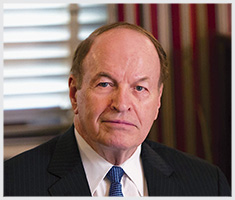The Honorable Richard Shelby: Championing Policies and Legislation that Promote Medical Breakthroughs

I am a prostate cancer survivor and have been cancer-free for 24 1/2 years. The cancer diagnosis changed my perspective on life. It made me appreciate every day. I get up in the morning and am eager to get to work. I do my best to support policies and legislation that will reinforce and promote impactful discoveries in the medical field, particularly as they pertain to research and curing terminal diseases such as cancer.
In 1994, I was diagnosed with prostate cancer after a prostate-specific antigen (PSA) test indicated I had elevated PSA levels and needed follow-up. My doctors at the Walter Reed Army Hospital offered me several treatment options, and I opted to have surgery. I am immensely grateful for my doctors, they saved my life. I also know that if it weren’t for the advancements in research that provided me with cutting-edge treatment options I might not be here today.
I am not the only member of my family who has had cancer. Several family members have been diagnosed with the disease, and my father passed away from prostate cancer when he was 77. Cancer has been prevalent in my life, and it has motivated me to do everything in my power to support revolutionary breakthroughs in cancer research and advancements in medicine.
A balance in public and private funding for medical research is important. Several companies in the private sector do a great job of researching and discovering new medications for dozens of diseases that affect Americans. However, private research dollars do not reach every form of cancer and rare disease. Therefore, funding for government agencies such as the National Institutes of Health (NIH) is paramount.
I am extremely proud of the fact that since I joined the Senate Appropriations Committee in 1994, we have nearly quadrupled medical research funding for the NIH. In FY 2019, we appropriated more than $39 billion for this vital government agency, and each year we closely analyze how much that allocation needs to go up.
Increasing funding for NIH and other medical research institutions not only benefits patients, it also brings high-paying research jobs to colleges and universities across the country. This boost in medical research job opportunities aids state-wide economies and local communities.
In Alabama, our research institutions received more than $350 million last year in medical research grants from the NIH, and I am proud to know that a researcher in Alabama may be able to find the next breakthrough in cancer treatment or advance against another disease such as lupus. In fact, the University of Alabama at Birmingham is one of the leading research hospitals focusing on advancements in precision medicine – the next generation of health care, discovery, and innovation. Additionally, the Mitchell Cancer Institute at the University of South Alabama in Mobile treats thousands of cancer patients each year and hosts cutting-edge research.
The United States leads the world in medical research. Our dedicated and hard-working researchers are continually making innovative discoveries and are poised to find new and lasting cures and treatments. Any reduction in government funding will hinder these efforts moving forward.
That is why, I will continue making NIH and cancer research funding a priority. It gives hope to families battling cancer and helps more people live longer, healthier lives.